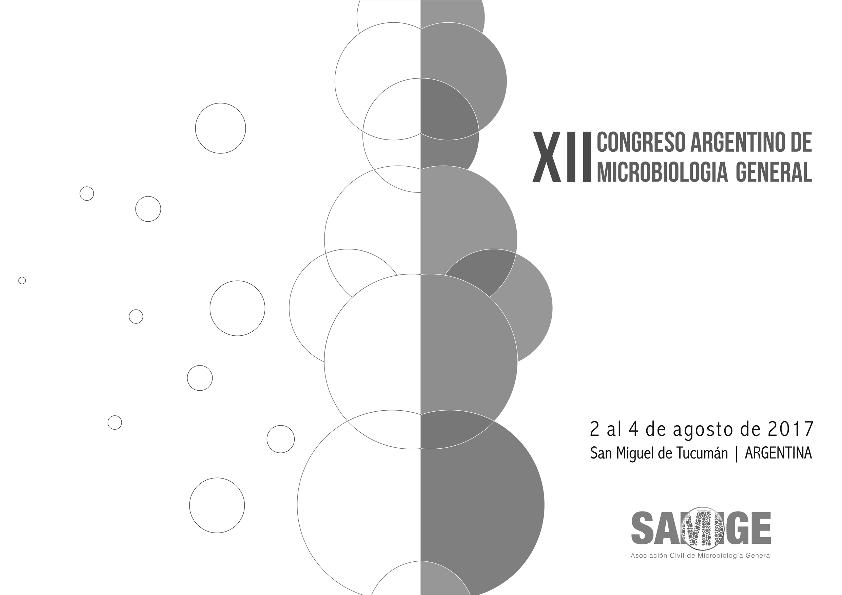Evento
Bioinformatic characterization of genes encoding xylan degrading enzymes in the paenibacillus sp. Ar247 and cohnella sp. Ar92 genomes
Pisa, José Horacio ; Hero, Johan Sebastian
; Hero, Johan Sebastian ; Romero Brunetto, Héctor; Perotti, Nora Ines
; Romero Brunetto, Héctor; Perotti, Nora Ines ; Martinez, Maria Alejandra
; Martinez, Maria Alejandra
 ; Hero, Johan Sebastian
; Hero, Johan Sebastian ; Romero Brunetto, Héctor; Perotti, Nora Ines
; Romero Brunetto, Héctor; Perotti, Nora Ines ; Martinez, Maria Alejandra
; Martinez, Maria Alejandra
Tipo del evento:
Congreso
Nombre del evento:
XII Congreso Argentino de Micorbiología General
Fecha del evento:
02/08/2017
Institución Organizadora:
Asociación Argentina de Microbiología;
Título del Libro:
XII Congreso Argentino de Micorbiología General
Editorial:
Asociación Argentina de Microbiología
Idioma:
Inglés
Clasificación temática:
Resumen
The increasing interest to renewable lignocellulosic materials for the production of environment-friendly chemicals and biofuels boosts the search of new carbohydrate-active enzymes (Cazymes) and microbial strains. In this study, we analyze the draft genomes of two highly hemicellulolytic bacteria isolated from industrial liquor samples from the local paper industry to unravel their xylan degrading pathways. Gene annotations were carried out using Rapid Annotations Subsystems Technology (RAST) 2.0. BlastP was employed to find orthologous genes between the translated proteins from the predicted open reading frames of both genomes and a local database consisting on the translated proteins of the141 genomes of the Paenibacillaceae family members available on NCBI database up to date. Only bidirectional matches were considered. To identify potential Cazymes, translated proteins were submitted to the dbCAN database. The genome sizes were 7.1 Mb (Paenibacillus sp. AR247) and 6.0 Mb (Cohnella sp. AR92), which contained 7159 and 5439 coding sequences, respectively. 51 orthologous genes were found by the BlastP analysis, most of which corresponded to ribosomal genes. The phylogenetic tree built on the basis of those concatenated gene sequences showed Cohnella genus (including the strain AR92) as a monophyletic group within the paraphyletic group of Paenibacillus spp. The strain AR247 was found to be related to Paenibacillus sp. P1XP2, Paenibacillus pini JCM 16418 and Paenibacillus sp. IHB_B 10380, forming a well support clade.Both genomes displayed multiple genes encoding a broad variety of extracellular and cell-wall (SLH domians) of endo-β-1,4-xylanases (GHs 10; 11; 30 and 43), some of which also showed CBM domains (mainly CBM9; 22; 6). Sequences encoding potential intracellular exo-oligoxylanase (GH8) and β-xylosidases (GHs 39; 43; 51 and 52) were identified, which might be responsible for processing the products released by the extracellular enzymes. Finally, the overall assimilation could be performed by intracellular debranching enzymes α-glucuronidase (GH67), α-arabinofuranosidase (GHs 43 and 51) and acetylxylanesterase.The redundancy of GH genes observed in the analyzed genomes, the predicted enzyme architectures and their cellular localization are in agreement with other well descripted Paenibacillus species. Therefore, the strains AR247 and AR92 might display similar strategies for the degradation of xylan.
Palabras clave:
BIOINFORMATICA
,
PAENIBACILLUS
,
COHNELLA
Archivos asociados
Licencia
Identificadores
Colecciones
Eventos(PROIMI)
Eventos de PLANTA PILOTO DE PROC.IND.MICROBIOLOGICOS (I)
Eventos de PLANTA PILOTO DE PROC.IND.MICROBIOLOGICOS (I)
Citación
Bioinformatic characterization of genes encoding xylan degrading enzymes in the paenibacillus sp. Ar247 and cohnella sp. Ar92 genomes; XII Congreso Argentino de Micorbiología General; San Miguel de Tucumán; Argentina; 2017; 1-2
Compartir



